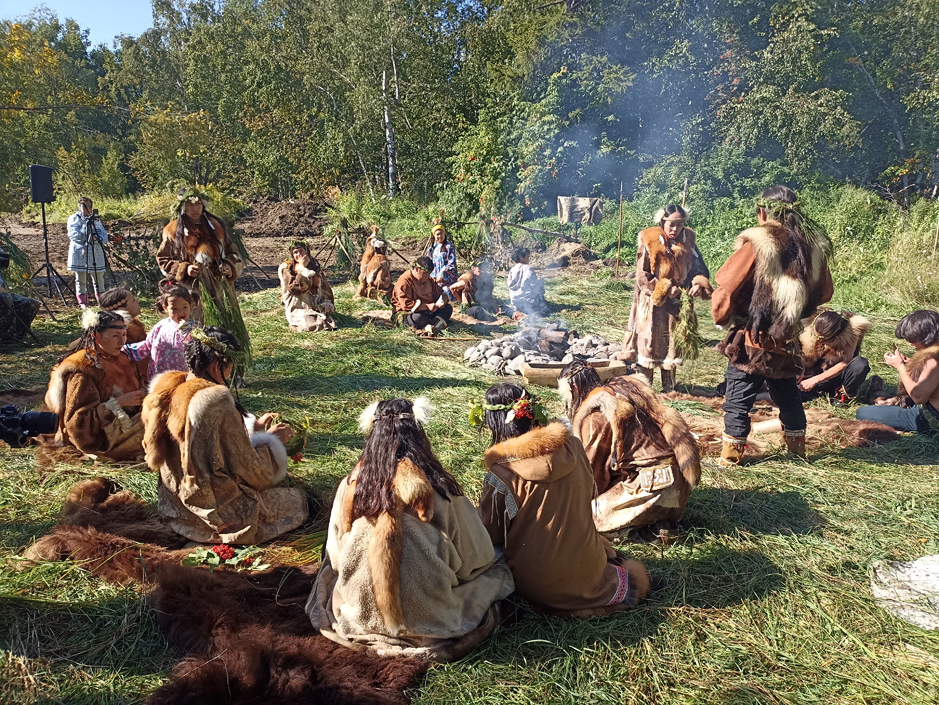Modern culture and crafts, folklore groups, professional art
According to scholars, the modern Kamchadal culture is a syncretic one, in which the ancient animistic ideas coexist with Orthodox rituals and a certain spontaneous ironic atheism inherited from the ancient Kamchadals. The process of reviving the ethnic culture of the Kamchadals in Kamchatka is largely connected with the activities of the writer Georgy Porotov. He had traveled throughout Kamchatka for a long time, studying the cultures of many northern peoples. The acquired knowledge translated into awareness of the need to systematically reconstruct and represent the world of Kamchadal culture. Having gathered like-minded people around him, Georgy Porotov became the creator and active promoter of the multi-ethnic culture of the old-timer population of Kamchatka.
One particular result of his activity was a stage production of Alkhalalalai, the ritual autumn holiday of the ancient Kamchadals, recorded at one time by Stepan Krasheninnikov. This ritual, first staged in 1987 in the village of Kovran, soon outgrew the stage and “took to the streets”, becoming a standard ritual holiday for the entire Peninsula, a symbol of both the Itelmen and Kamchadal culture.
Other public figures have also made a major contribution to the development of Kamchadal culture. They preserve the memory of their ancestors, collect and publish Kamchadal folklore, compile genealogies, and hold meetings of an extended circle of relatives of several generations.
An active public figure and enthusiast of the revival of Kamchadal culture is Sergei Vakhrin. Being a Kamchatka Kamchadal himself, he was born in the village of Tilichiki, Olyutorsky district, and spent his childhood in Ust-Kamchatsk. In his early youth, he developed an interest in the history of the region, and the origin and ethnic uniqueness of the Kamchadals. Subsequently, he has always fought for the recognition of the ethnonym Kamchadal and campaigned to increase the legal and social status of members of this ethnic group.
Sergei Vakhrin is a member of the Union of Writers and the Union of Cinematographers of Russia. Keeping up with the times, he created a website (kamchadaly.ru) dedicated to the history of Kamchatka, the formation of the indigenous population of the region, and the genealogies of the famous Kamchadal families. According to him, “... the site is designed for Kamchadals in the broadest sense of the word: both the native dwellers and those who have migrated. It is open to everyone. We have a forum on a variety of issues and topics related to Kamchatka and its inhabitants. Here you can talk about your family roots, and publish documents, photographs, and memories. You can post materials about your homeland, search for lost friends...”
Sergei Vakhrin is the author of the books “Conquerors of the Great Ocean”, “Meeting the Sun”, “Descendants of the Sharp-Beaked God”, etc. He puts a lot of effort into studying the genealogy of Kamchadal families, identifying the origin of Kamchadal clans and the etymology of Kamchadal last names.

One of the most famous Kamchadal ensembles is “Kyksha-ai”. It was founded in 2012 in the village of Milkovo as part of the House of Culture. The creator and first leader of the ensemble was Elizaveta Dolgan, who initially taught children’s classes. Then adults got involved in the activities. The ensemble included representatives of the ancient Kamchadal families: the Mikhailovs, Permyakovs, and Shishkin-Plotnikovs. Representatives of three generations are active in the ensemble’s life. In 2016, the ensemble was awarded the title of “People's Amateur Collective” for its high artistic level, performing skills, and active work in preserving the Kamchadal culture. The ensemble's repertoire reflects the life and traditions of the indigenous inhabitants of Kamchatka. The members perform during ritual celebrations, in folklore and ethnographic expeditions, festivals, competitions, and shows. The Director of the ensemble is currently Mikhail Tolman. The members of the ensemble introduce guests to the history of the region, and the culture of the indigenous peoples of Kamchatka, and conduct master classes and ethnic games. The spectators are always looking forward to the performances of the collective.

























































